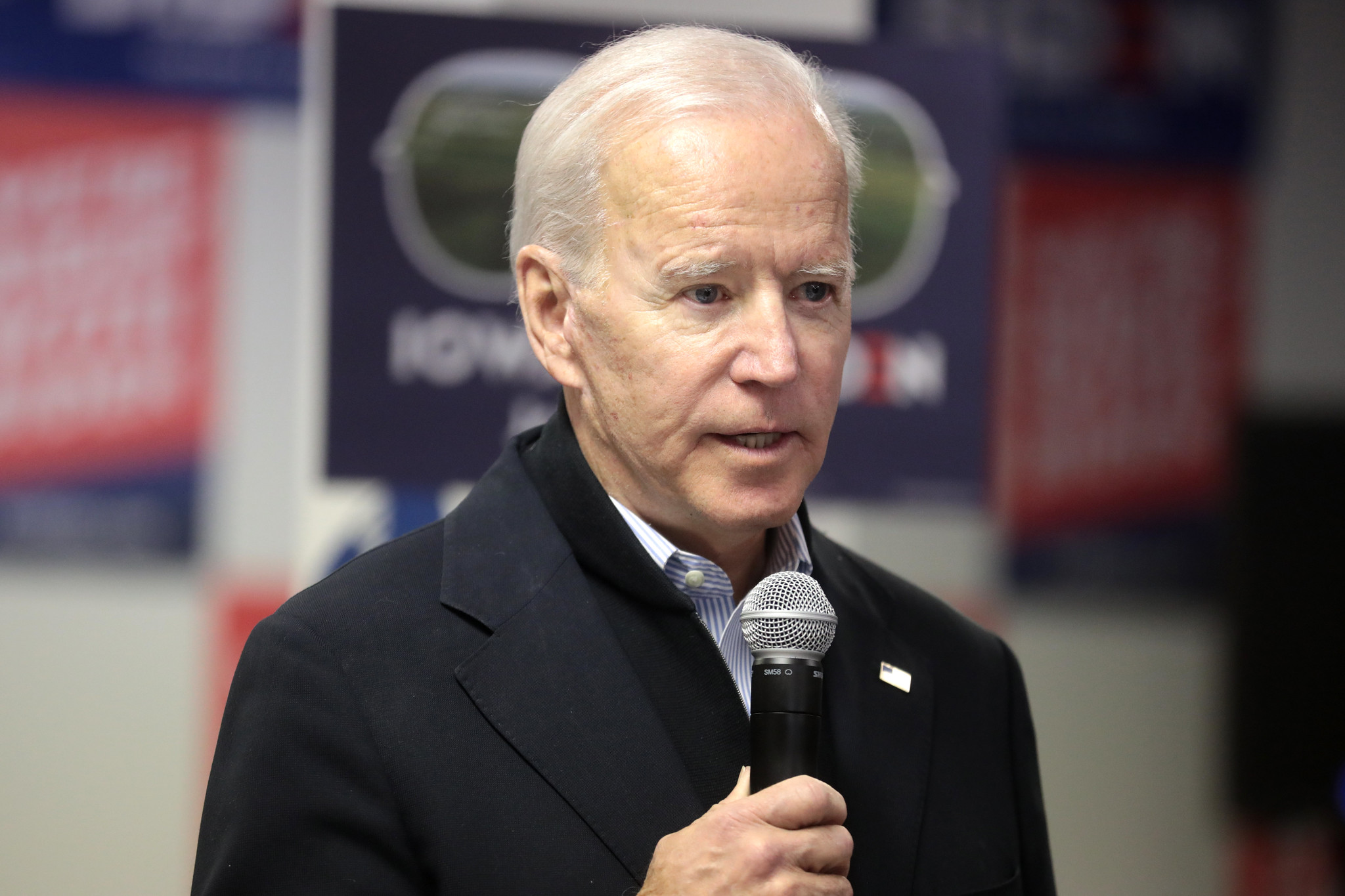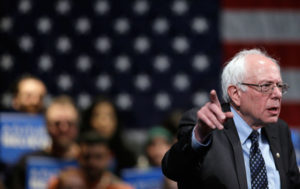The Myth of Joe Biden’s Electability
Democrats who insist that the former vice president is the safest bet this November conveniently overlook his neoliberal economic policies. Former Vice President Joe Biden. (Gage Skidmore / Flickr)
Former Vice President Joe Biden. (Gage Skidmore / Flickr)
What follows is a conversation between journalist Mark Weisbrot and Greg Wilpert of The Real News Network. Read a transcript of their conversation below or watch the video at the bottom of the post.
Greg Wilpert: It’s The Real News Network. I’m Greg Wolpert in Baltimore. Now that the race for the Democratic nomination for president is down to mainly Bernie Sanders and Joe Biden, a large part of the debate and the corporate media revolves around which candidate is more electable or more likely to win in the general election against president Trump. Here are two examples of the media chorus that emphasizes the electability issue.
Speaker 2: I wonder if voters have internalized some of Joe Biden’s electability around the threat that Donald Trump obviously feels from him. Donald Trump is so terrified of running into Joe Biden that he risked his entire presidency. He bet the farm on his whole presidency to kill him off politically.
Speaker 3: I think you saw hundreds and thousands of people coming out coast to coast, Democrats. And one thing ruled above all, they are not willing to roll the dice on the future of this country by wasting a vote.
Speaker 2: That’s right.
Speaker 3: They want to win. They want someone who can beat Donald Trump. And I think many of them feel strongly now that in Joe Biden they have that candidate.
Greg Wilpert: Joining me now to explore this electability question is Mark Weisbrot. He’s co-director of the Center for Economic and Policy Research, and author of the book Failed: What The Experts Got Wrong About The Global Economy.
Thanks for joining us again, Mark.
Mark Weisbrot: Thanks for having me Greg.
Greg Wilpert: So I think we can explore the electability question from three different angles. First, what the polls say. Second, the policies that each candidate supports. And third, what history tells us what happened in this similar situation.
Now, regarding the polls, they seem to be relatively inconclusive. That is with Biden ahead in some of them and Sanders ahead in others. So, let’s take a look at this rather from the perspective of issues.
In a previous interview, we already took a look at Biden’s stance on the war in Iraq where he was far more instrumental in making the Iraq war possible than he admits. Now there’s other issues of course, and so let’s focus on those. Key domestic issues for voters will no doubt be social security and Medicare.
There’s a large gap between the older and the younger generation in terms of who they support. 18 to 34 year olds support Sanders with 47%, and Biden only 13%. While among senior citizens, Biden leads Sanders by a margin of 25% to 11%.
So let’s start with social security, which is something you’ve looked at in quite detail. Who ought to be more electable on this issue? Sanders or Biden?
Mark Weisbrot: Well, there’s no doubt about that. I mean, Biden has a history of decades of supporting actual cuts to social security benefits, and that hasn’t really gotten out there enough, but I think it will. And so he’s very vulnerable for that.
And he has a healthcare plan, which does provide something that’s an expansion of the Obamacare, the ACA. And so it provides something, a little bit, some more subsidies for premium for most of the population, but it totally leaves out people over 65. And I’m glad you emphasized that demographic because that’s the demographic that really is not only pro Biden, but it’s the more conservative demographic of the Democratic voters.
And they really do turnout. In the 2018 elections, for example, if you look at where Democrats lost, they only lost in the older demographic, over 50. If you took them out, Democrats would’ve won the Senate and everything else.
So, this is a really important demographic in the election. And so Biden’s support here is a mile wide, but an inch deep, because as soon as people find out what he’s doing on healthcare… so he’s provided nothing, absolutely zero for people over 65 who get actual Medicare. And I think a lot of people don’t know that because they’re thinking, well, Medicare for all, that’s getting everybody what I already have.
But no, it’s actually much more than that. They don’t have dental care. And, you look at the data, a lot of senior citizens are losing teeth because they don’t have dental coverage and they don’t have eyeglasses covered. They don’t have hearing aids covered, they don’t have long-term care, and Biden provides them absolutely nothing.
So here’s healthcare reform, and it leaves out the over 65. There is one thing in there for long-term care, but it’s a non-refundable tax credit, so the vast majority of seniors wouldn’t be eligible for it.
So, there’s really nothing for them, and that’s going to be a scandal when that actually gets into the campaign, because that’s a really big thing. I mean, they’re going to realize that everybody at least is going to get some little bit from this healthcare reform and they’re getting nothing at all.
Greg Wilpert: Mm-hmm (affirmative). I just want to return quickly to the issue of social security now, I mean, why is it that Biden keeps talking about… and how recently has he been talking about cutting social security? Has his position remained the same on that? And what is Sander’s position on social security?
Mark Weisbrot: Yes. Well, Biden supported cutting cuts to social security, very significant cuts. At that time it was a cut in the cost of living allowance, and that was 2013. So it’s not what he did in 1995 and in ’84 also where he supported cuts, this was fairly recently. And, so he’s only changed his position now in this campaign where he now supports an expansion of benefits, but it’s nowhere near what Bernie Sanders is supporting, which is a strong expansion of benefits.
And they have just a whole different record going back. I mean, Bernie’s been in Congress since 1991, he’s been fighting to expand benefits when he had, maybe three people on his side, and Biden was on the other side. So there’s a long track record. I think that’s another thing that’s going to come out, because right now he can get away with it, nobody’s paying that close attention.
Now, it’s a head to head race between those two and people are going to see the differences. And that’s another real difference that’ll come out. I mean, Bernie, one of the reasons he’s popular is he’s authentic, he has this long track record. He’s been consistent for decades.
And when he talks to the voters, he doesn’t talk to them… he doesn’t even like to talk about himself at all. They’ll ask him a question about himself, even his religion, and he quickly says, “I want to talk about the issues.” He’ll answer them because he has nothing to hide, but what most candidates have is the idea that voters can’t understand these things, and therefore I have to talk about my life and my upbringing and my uncle, what my grandfather said, and all the things that Biden likes to talk about.
He’s really addressing them on these issues. And that’s going to come out more and more, I think, in the weeks and months ahead.
Greg Wilpert: Now, what do you think are some of the other issues that Biden might be vulnerable on, or that SAnders could be vulnerable or strong on that would affect their ability to win in a race against Trump in November?
Mark Weisbrot: Well, I think trade is big, also. You mentioned the war, I think that’s also big, and we talked about that before. I mean Biden led the effort to give president George W. Bush permission from Congress, authority from Congress, I should say, to invade Iraq. And that’s a big thing that’ll come out also.
But, the trade issues are very big. If you look at… everybody knows Wisconsin, Michigan, Pennsylvania, that’s where the electoral votes that gave Trump the election were won last time. And why did he win them? Well, one reason he won them is you look at those States, those were people hit very hard by the so-called trade agreements, I call them commercial agreements because they’re not really so much about trade, but they cost a lot of jobs.
We lost 5 million manufacturing jobs in the United States after 2000. Those voters, those swing voters, those were the ones that were most hit. In fact, you can even look at Trade Adjustment Assistance, which is a federal program that actually pays people who lost their jobs as a result of these commercial agreements. So you have to be certified. So it’s a small fraction of the people who really lost their job.
And you look at those three States and it’s vastly more than the margin that Trump won that gave him the election. And then you had the Trans-Pacific Partnership at that time, which unfortunately at that time, president Obama was going around the country campaigning for the TPP, and Hillary had campaigned, had been very strongly in favor of the TPP, and she changed her position for the election.
And that was a very big issue that Trump played upon. And it’s the only one he actually delivered on where he did reject the agreement, which is not clear at all would have happened if he hadn’t won.
So that’s, I think, going to be a major issue going forward. And those are the real swing voters. I mean, the biggest and most likely group of swing voters in the next election will be people who were negatively affected by those agreements, not only from lost jobs, but lower wages, greater job insecurity and everything else that came out of those agreements.
Greg Wilpert: Mm-hmm (affirmative). Well that’s actually something I wanted to focus on next, is that historical comparison to 2016, and as you point out, that this was the main place where the election was lost in 2016 was precisely in those battlefield States. And even though Hillary Clinton won the popular vote by 3 million votes or a 2% difference, she still lost.
So how does this now compare? I mean the thing that… of course you mentioned that Biden is weak on the trade issue, which is particularly vulnerable. Now of course the thing that Trump would bring out if Sanders were the nominee is that he is too far left, that he’s a socialist, and now they’re even dragging out that he had… one point, I just saw, a report that he wanted to create a sister city within the Soviet union at that time in 1980s.
So, I mean, if you make that comparison, then, you’ve got a neoliberal candidate, basically, who contributed to the dismantling of manufacturing in the Midwest. And then you’ve got somebody else who the mainstream media, the corporate media, are going to paint as a sort of communist. How do you think this will play out ultimately?
Mark Weisbrot: Well, this again shows the absolute superficiality of what just happened, the reversal in the primary, where Sanders was way ahead of Biden. And in fact, I was on Democracy Now a few weeks ago, introducing the film that we talked about here about Biden’s role in the Iraq war. I had to spend the first minute or two just convincing people that Biden was still relevant so that they would watch it.
And so you can see this kind of volatility is a result of this superficiality of the changes in the voting patterns. In other words, this is exactly what you said, the media went on a big campaign to convince people that Biden was more electable.
Biden himself didn’t even do it, he didn’t even have the money for the ads to do what the media did. And, of course, yes, front page article in the New York times yesterday, which was amazing. It was a very painstakingly detailed story about Bernie Sander’s trip to the Soviet union in the 1980s, when Ronald Reagan was supporting actually what he was doing, trying to improve relations with the Soviet union at that time.
And, they made it look like the Soviets were just using it for propaganda and all that stuff. It was a horrible, right out of the 1950s kind of article.
I think now the question is, can this really hold up? This shift that you have, which, all the polling data shows that the shift was a result of people voting in the primary on the basis of this so-called electability.
I don’t think it can hold up, because first of all, this idea that Bernie is too radical. I mean, as the issues come out, it will be clear that what Bernie is, is a social Democrat of the kind that have been in power in France and Germany and the UK for most of the post World War II period.
And he wants to get for American voters what voters in Europe have gotten, what voters that in countries that are not even as rich as us have, including, of course, first and foremost, healthcare as a human right for everyone. But also some other advances that they have in terms of our work hours and vacation time and things that we don’t have here in the United States. And some job security, maybe the right to organize labor unions, which has been vastly weakened in the United States.
So, these are the kinds of things he’s asking for, it’s not revolutionary. In fact, you can make a case that he’s actually the moderate candidate, and what’s radical are the changes that have come to the United States in the post Reagan era, which Biden was a supporter of all the way from welfare reform to financial deregulation, to everything.
The commercial agreements that we talked about, that really transformed the society from one in which, those who are old enough to remember, one wage earner with a median wage could actually buy a home and support a family, and send their kids to college and they wouldn’t come out with a lifetime of unpayable debt.
Greg Wilpert: Mm-hmm (affirmative). Yes. I think that’s going to be very interesting to see how this plays out, of course, because what it all depends on is whether the corporate media, basically the mainstream media pay attention to these records. But we’ll have to see, and of course we’re going to do our part in trying to bring out to light what’s going on and what the actual records are.
But we’re going to leave it there for now. I was speaking to Mark Weisbrot, co-director of the Center For Economic And Policy Research.
Thanks again, Mark for having joined us today.
Mark Weisbrot: Thank you, Greg.
Greg Wilpert: And thank you for joining the Real News Network.
Your support matters…
Independent journalism is under threat and overshadowed by heavily funded mainstream media.
You can help level the playing field. Become a member.
Your tax-deductible contribution keeps us digging beneath the headlines to give you thought-provoking, investigative reporting and analysis that unearths what's really happening- without compromise.
Give today to support our courageous, independent journalists.









You need to be a supporter to comment.
There are currently no responses to this article.
Be the first to respond.